What you need to know about D&D5E to play Baldur's Gate 3
Whether you're an old hand familiar with previous editions, or completely new to Dungeons & Dragons, this guide will catch you up with its 5th edition.
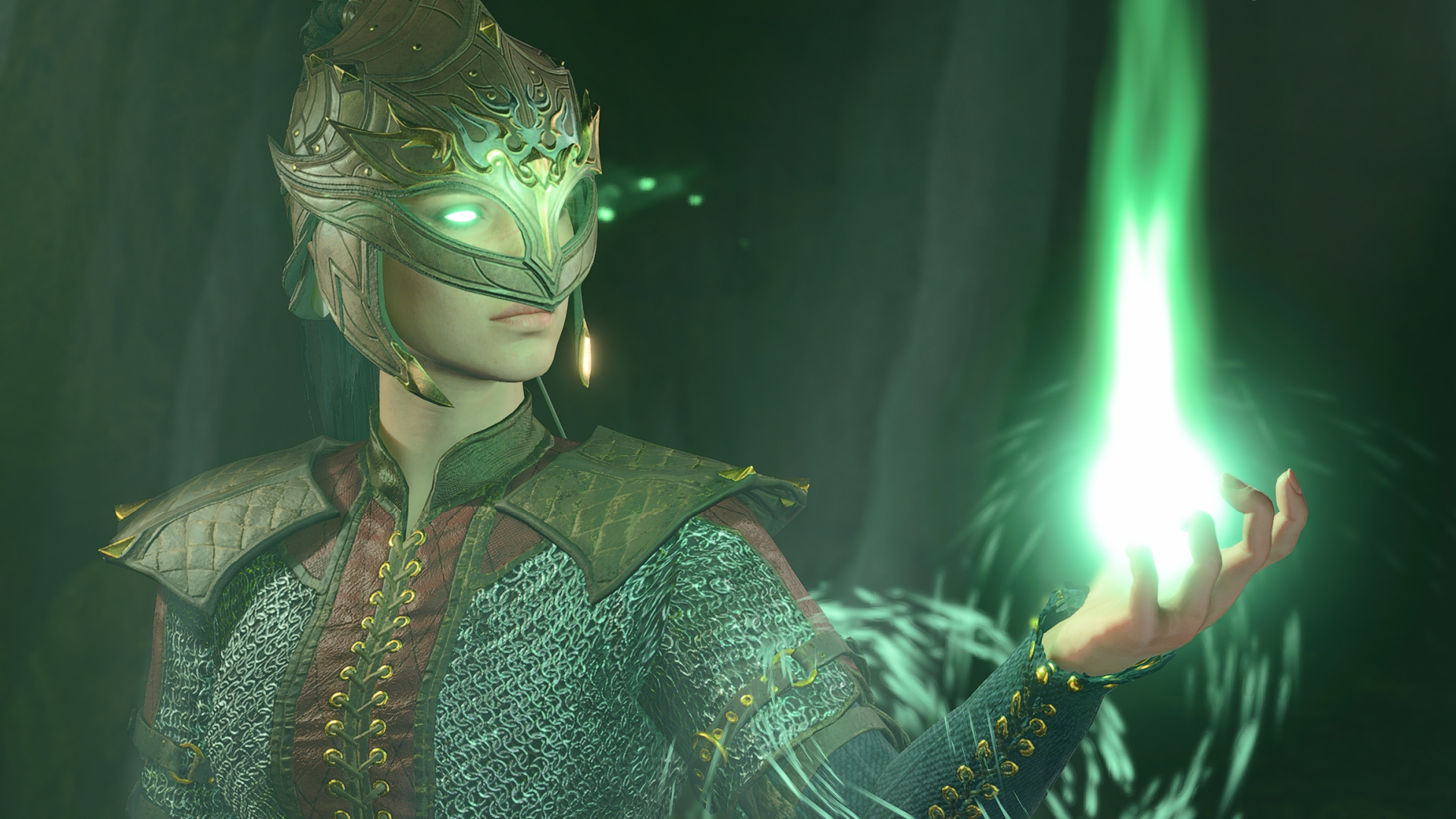
In Baldur's Gate 3 there are "something like 600 spells and actions," according to Larian's release showcase. That sounds intimidating, especially if you're not already au fait with Dungeons & Dragons, which is an arcane game that evolved out of tabletop wargaming in a dark and ancient lost age called the 1970s.
Fortunately Baldur's Gate 3 uses the 5th edition, D&D5E as it's known, which is the easiest version of D&D to learn and also the best. There's a universal mechanic that resolves basically everything you can do and a straightforward rule for raising or lowering your chances of success. 5E is also a system where it's hard to completely screw yourself by making bad choices at level-up, unless you do something ridiculous with multiclassing, which is easily avoided by, well, not multiclassing. In D&D's third edition, if you made it to level 20 with only a single class under your belt you'd fucked up, but 5E is happy to let you just be a wizard forever. Which is certainly all I want from life.
D20 is the best D
The first thing to know about 5E, whether played around a table or in Baldur's Gate 3, is that when you're faced with a challenge you reach for a 20-sided die—a d20 for short. Whether you're investigating a mind flayer device in the tutorial or charming a talking statue into letting you pass, you roll a d20 and try to get equal to or higher than the Difficulty Class, or DC, of that challenge.
Sometimes Baldur's Gate 3 makes a big deal of the roll, as is the case when you click on that tub full of mind flayer goo. A big d20 appears, the DC you need to beat right there beside it. Behind the scenes, the same thing is happening when smaller d20s appear above the party's head as you explore, only here it's a roll to spot a trap or hidden treasure or the like. In combat the dice rolls are translated into things like a 55% chance to hit, but click the little arrows on the bottom-right of the screen and a text log will appear, summarizing the rolls.
A quite easy challenge might demand you to roll a 5 or higher, while something a bit trickier could demand a 10 or 12 or thereabouts (they don't have to be multiples of five, but often are for simplicity's sake). Think of DC 15 as a bronze-medal kind of challenge, DC 20 as silver, and DC 25 as gold.
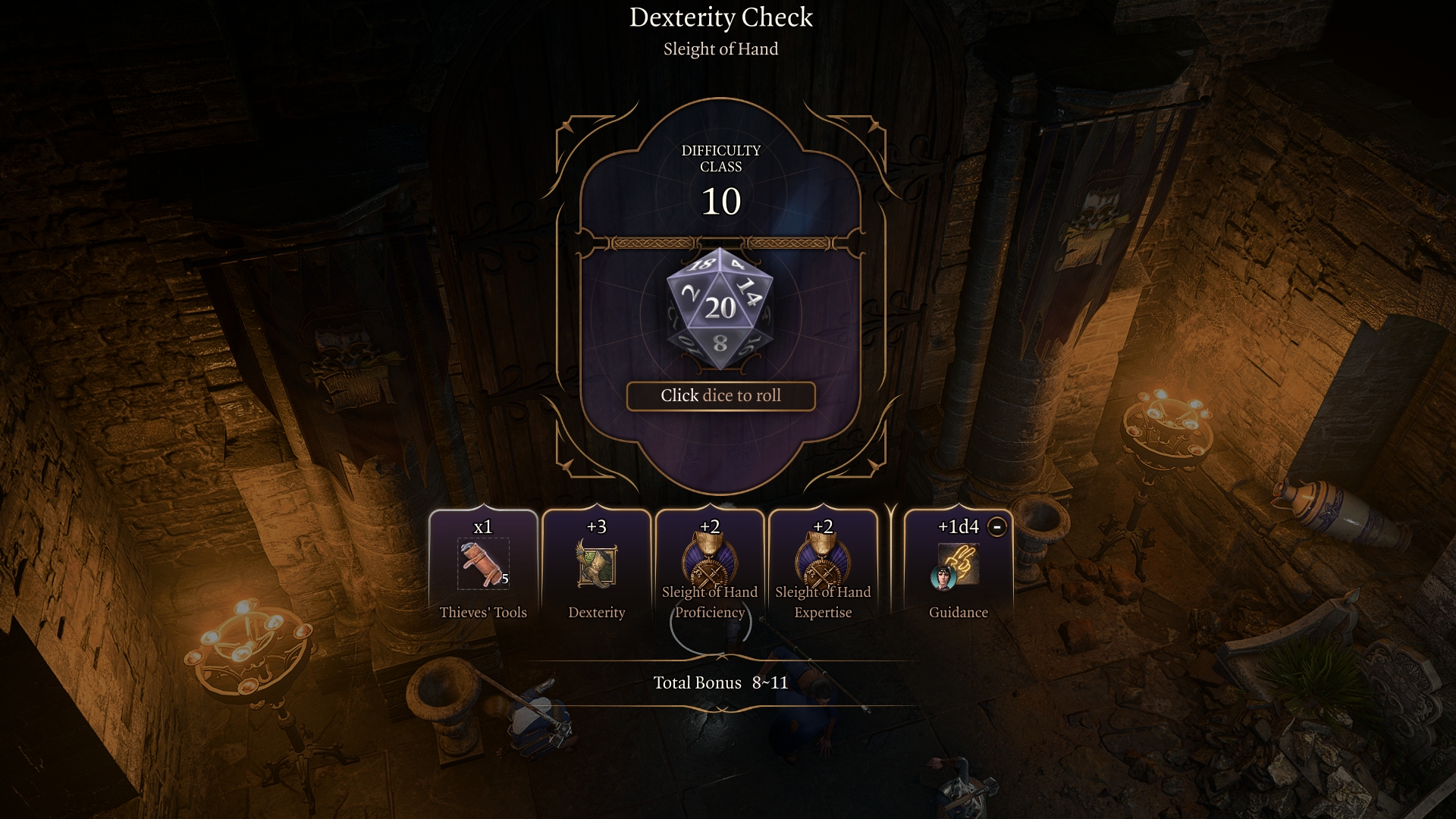
How do you roll a 25 on a 20-sided die? That's where bonuses come in. Characters in D&D are defined by abilities like Strength, Intelligence, and Charisma, and the higher an ability score, the higher the number you add to relevant rolls. There's also a proficiency bonus to add on top of that, which gets counted for anything your character would be trained in based on their chosen class and background. A wizard like Gale might be proficient in the investigation skill, which along with his high Intelligence would make him better at examining alien technology. When it comes time to seduce a talking statue, however, the bard with a high Charisma and proficiency in the persuasion skill is going to shine.
If you played D&D3E or any games based on it like Pathfinder, you'll be expecting DCs to go up as the game goes on, and to be assigning skill points every time you level up. The good news is that 5E does away with that nonsense. It uses "bounded accuracy", which is a game-design-blog way to say "the numbers don't go up". A level one noob trying to do something a world-class athlete would struggle with still has to hit a DC 20, while a high-level badass trying to do something quite easy still has to roll against DC 5.
One house rule Baldur's Gate 3 adopts is that a roll of 20 is always a success, and a roll of 1 always a failure, no matter what modifiers you add or subtract. Normally in D&D a 20 is only considered an automatic success in combat—a critical hit, which lets you roll twice as many damage dice. (We'll get to that.) Players love to see crits, so it's a super common homebrew ruling to have a natural 20 always succeed and a nat 1 always fail, no matter the circumstance. It means anyone can try something godlike, even if it's got a DC of 30, and have that tiny hope of success.
Keep up to date with the most important stories and the best deals, as picked by the PC Gamer team.
There's another way of increasing your odds, and that's with advantage, which is usually granted by outside circumstances or character abilities. If you attack someone while hidden, for instance, you gain advantage on your roll to hit, which means rolling two d20s and picking the higher roll. You might also get advantage on a roll to intimidate someone by knowing their secret and threatening to reveal it, or on a roll to recall an obscure bit of history by having access to a well-stocked library.
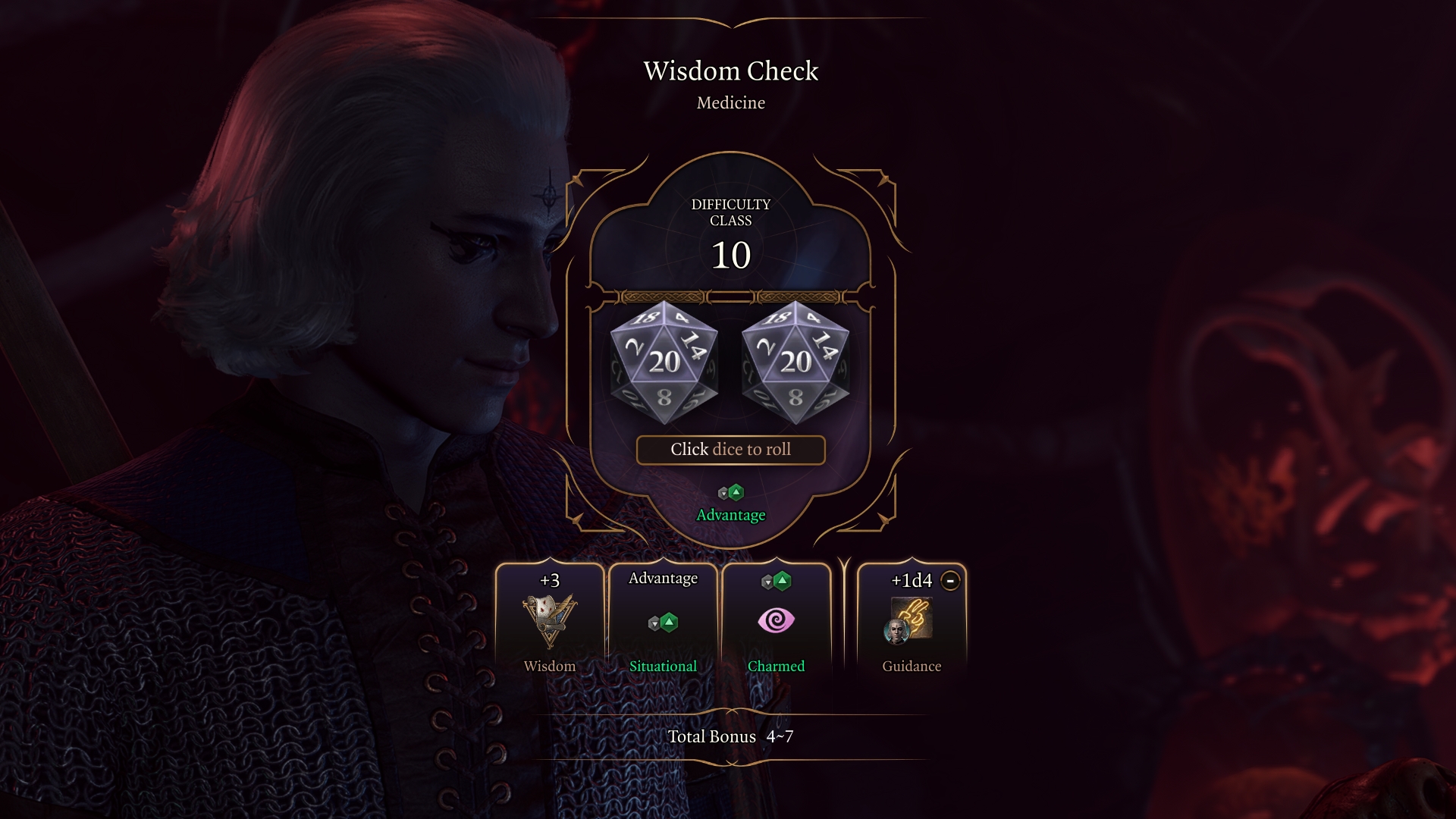
The flip side is disadvantage. Say you've made a custom dark elf character, who has severe sunlight sensitivity from living underground. When the dice come out to see who spots something hidden in the woods, you'd have disadvantage, which means rolling two d20s and taking the lowest. In situations where both advantage and disadvantage apply, the two cancel out and you roll a single d20 like normal.
Acrobatics — Dexterity
Athletics — Strength
Animal Handling — Wisdom
Arcana — Intelligence
Deception — Charisma
History — Intelligence
Insight — Wisdom
Intimidation — Charisma
Investigation — Intelligence
Medicine — Wisdom
Nature — Intelligence
Perception — Wisdom
Performance — Charisma
Persuasion — Charisma
Religion — Intelligence
Sleight of Hand — Dexterity
Stealth — Dexterity
Survival — Wisdom
There's no such thing as "double advantage" or "double disadvantage" either. If there's more than one source of help or hindrance it's ignored: you either have it or you don't. In practice it's just simpler this way, and prevents endless angling for more sources of advantage or quibbling over what counts and what doesn't. It's easier to remember too.
Finally, spells and abilities can assist as well. The guidance spell, which Shadowheart can cast at will, gives you an extra d4 to roll and add to the d20 when you make an ability check, while pass without trace adds 10 to stealth checks. The bardic inspiration ability, a mainstay of bards as the name suggests, also lends bonus dice to d20 rolls. Now you know why Geralt keeps Dandelion around.

Killing people and taking their stuff
That's the core mechanic of D&D5E, and once you know that you know almost everything. Someone casts hold person and you need to roll a Wisdom saving throw to escape? That'll be a d20 plus your Wisdom bonus, plus your proficiency bonus if "Wisdom saving throws" are a thing you're proficient in. (If you're a spellcaster you probably are.) Want to shoot an arrow at an imp that's about to set you on fire? Roll a d20, plus your Dexterity bonus, plus your proficiency bonus if bows are a thing you're proficient in. (If you're a fighter like Lae'zel, a ranger, or a wood elf that's probably a yes.)
Combat's more complex, because this is a ruleset based on 1970s wargames, remember. On your turn you can move and perform an action. Actions are things like attacks, or most spellcasting. You can also use an action for an extra move, which is called a dash. You might get a bonus action on top of that, often to represent your class abilities. A barbarian going into a rage or a bard granting an ally bardic inspiration? Those are bonus actions.
Everyone gets a reaction too, which is spent if you get the chance to butt in and do something when it's not your turn. Taking an attack of opportunity if someone tries to run away from or past you costs your reaction, and so does casting the shield spell to block an attack that would otherwise hit Gale's frail wizard bones. You only get one reaction per turn, so once you've used it anyone can run past you unimpeded. Monsters only get one reaction each turn too, so if you need everyone to run past an ogre, have the toughest hero go first to use up its attack of opportunity.
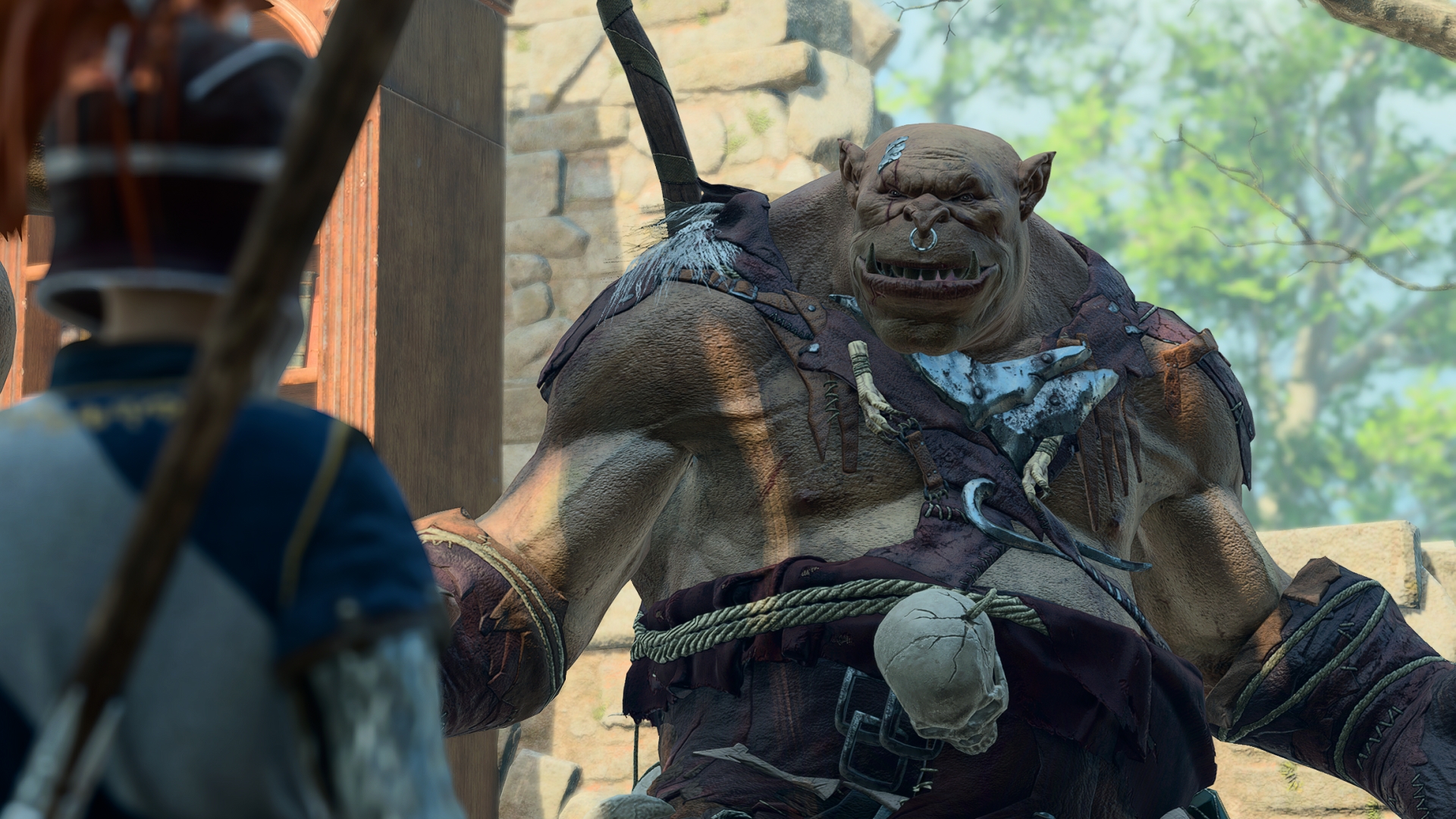
This is the "action economy" of D&D5E, which regulates how much you can do on a turn. One complication is that Baldur's Gate 3 bends 5E's rules a little. Shoving someone out of the way to make room in combat, or hurl them off a cliff, costs an action in 5E, but just a bonus action in Baldur's Gate 3. That makes fighting on ledges a riskier proposition—anyone can take their normal attack, and then do a shove as well. Since a shove also wakes up anyone who has passed out, it makes the sleep spell less effective too.
Baldur's Gate 3 also lets you take multiple bonus actions in some circumstances, which is technically against 5E's rules. The rogue subclass of thief can normally use their Fast Hands ability to disarm traps, open locks, or perform sleight of hand as a bonus action. In Baldur's Gate 3, it gives them a bonus bonus action. Why? Ask Swen Vincke.
With a basic attack action, you roll that d20 and add your relevant bonuses. Ranged attacks like shooting a bow use Dexterity, and melee attacks like swinging a longsword use Strength. If you've got a weapon with the finesse tag, like a dagger or the rapier Astarion wields, you can use Dexterity for melee attacks. Ranged spell attacks are different again—if you're a wizard you use Intelligence, if you're a cleric or druid it's Wisdom, if you're a warlock, sorcerer, or bard it's Charisma.
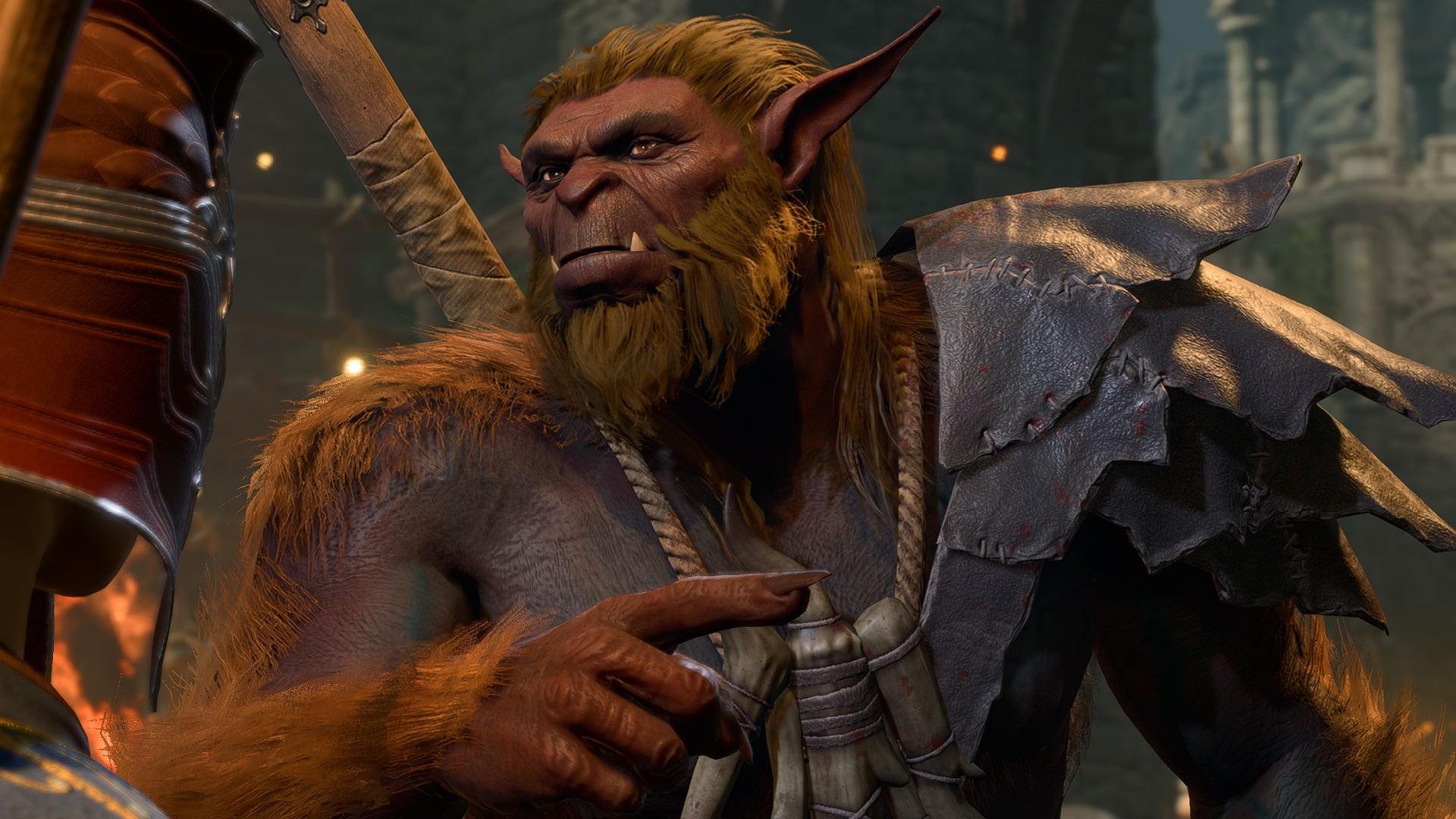
Rather than a Difficulty Class, the number you're trying to beat is an Armor Class. Better armor and higher Dexterity make that go up, and so does wielding a shield. Even if a character like La'ezel or Shadowheart shoots a bow, it's worth switching back to a sword and shield configuration before the end of the turn so that you get that +2 to armor class while the bad guys have their go. (In Baldur's Gate 3 you can swap back and forth between two saved loadouts at will, where in tabletop 5E you can swap once for free as part of an attack action.)
When you hit someone the damage dice come out, and here's one of the rare occasions you roll something other than a d20. Dinky little weapons like daggers do d4 damage, while a greataxe uses a d12. Weapons with the versatile tag do different amounts of damage based on whether they're held with one hand or two. That means if you're holding a longsword and nothing else you roll a d10 for damage, but if you hold, say, a shield as well it becomes a d8.
Magic could be a whole article on its own, but here are the basics. Every spellcaster has a number of spell slots they spend to cast spells, so if Gale has two level 1 spell slots then that means he can cast two level 1 spells and that's his lot. It's a good thing magic missile never misses. Cantrips don't cost anything but actions to cast, however, so Gale can sling fire bolt and acid splash all day.

Spellcasters get more slots as they level up. By level 3, Gale will have four 1st-level slots and two 2nd-level slots. If he uses up all those 1st-level slots and wants to cast one more magic missile he can, by spending a 2nd-level slot to do it. Slots are like spoons: you can put a smaller amount in a bigger spoon, but you can't fit a bigger amount in a small spoon. Also like spoons, you get them back by having a nap.
Union rules say we get an eight-hour long rest
Way back in the original Baldur's Gate games you'd click on the closed eyelid icon and the campfire would appear, or you'd find an inn and see if you could afford anything better than Peasant-tier accommodation. When you did, the healers would cast all their healing spells, then go to sleep for eight hours. Everyone would wake up with their spells back, and one extra hit point on top of whatever they got from Jaheira using her last cure light wounds. If you weren't fully healed? Time for another rest.
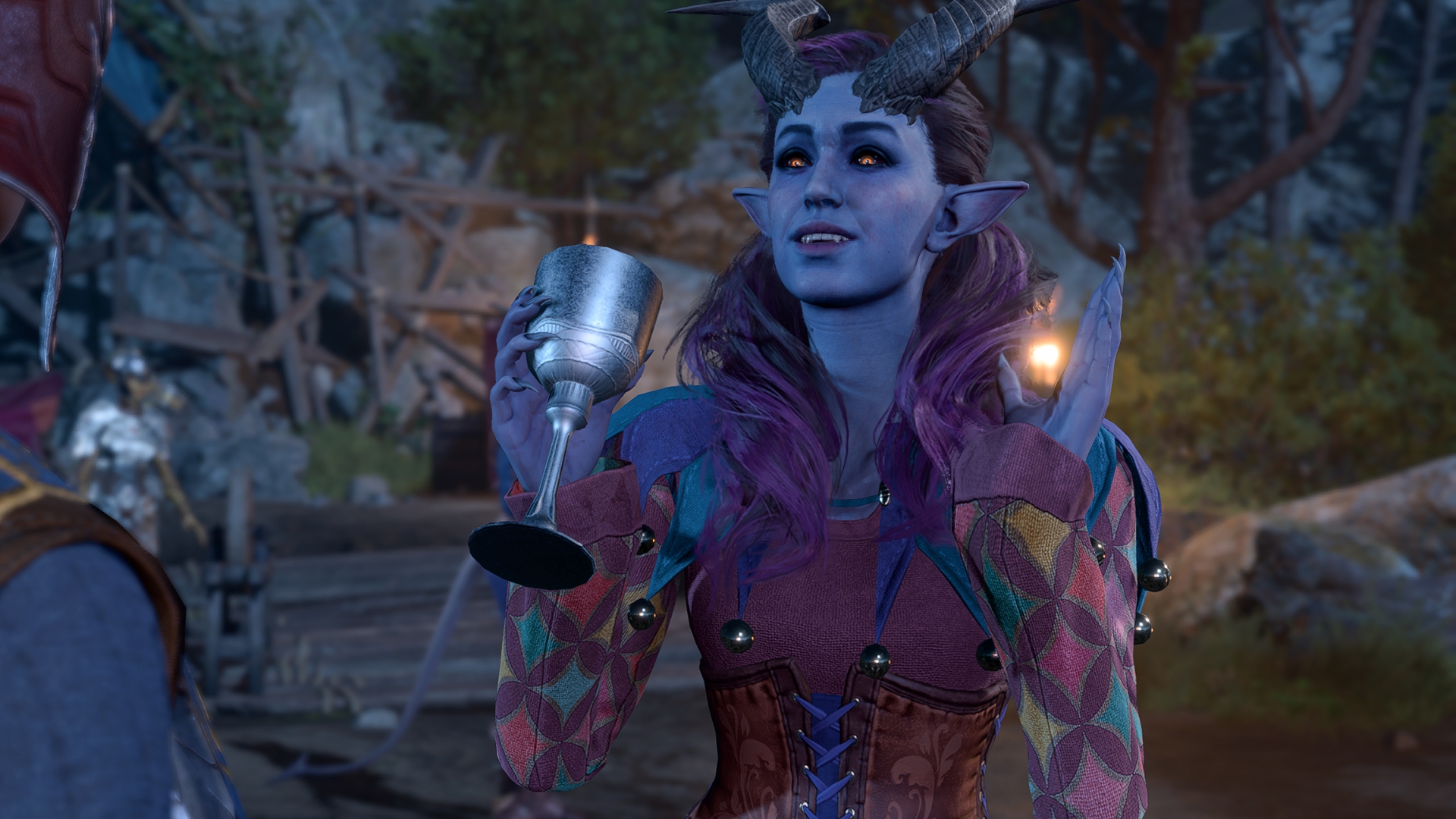
In 5E a full night's sleep is called a long rest, and it not only gives back your spell slots, bardic inspiration, and barbarian rage, but also all your hit points. You never need to double-nap, and thank goodness for that. In Baldur's Gate 3 long rests use up camp supplies, however, which is why every other barrel is full of cheese. You need 40 points worth of camp supplies to take an effective long rest, otherwise you get a partial rest and only get back some of those slots and hit points.
In between long rests you can take short rests. In tabletop 5E a short rest is an hour of downtime where you might tend to wounds and have a snack and a sit down, but in Baldur's Gate 3 they pass instantaneously. You get back some of your hit points from a short rest, but only warlocks regain spell slots. Which sounds unfair, until you look at how few slots they get. A level 2 warlock has two spell slots. A level 10 warlock? Two spell slots. The level of those slots goes up, but the number of them doesn't, so if you've got a warlock like Wyll in your party, don't skimp on the short rests. He's got a good reason for being so tired.
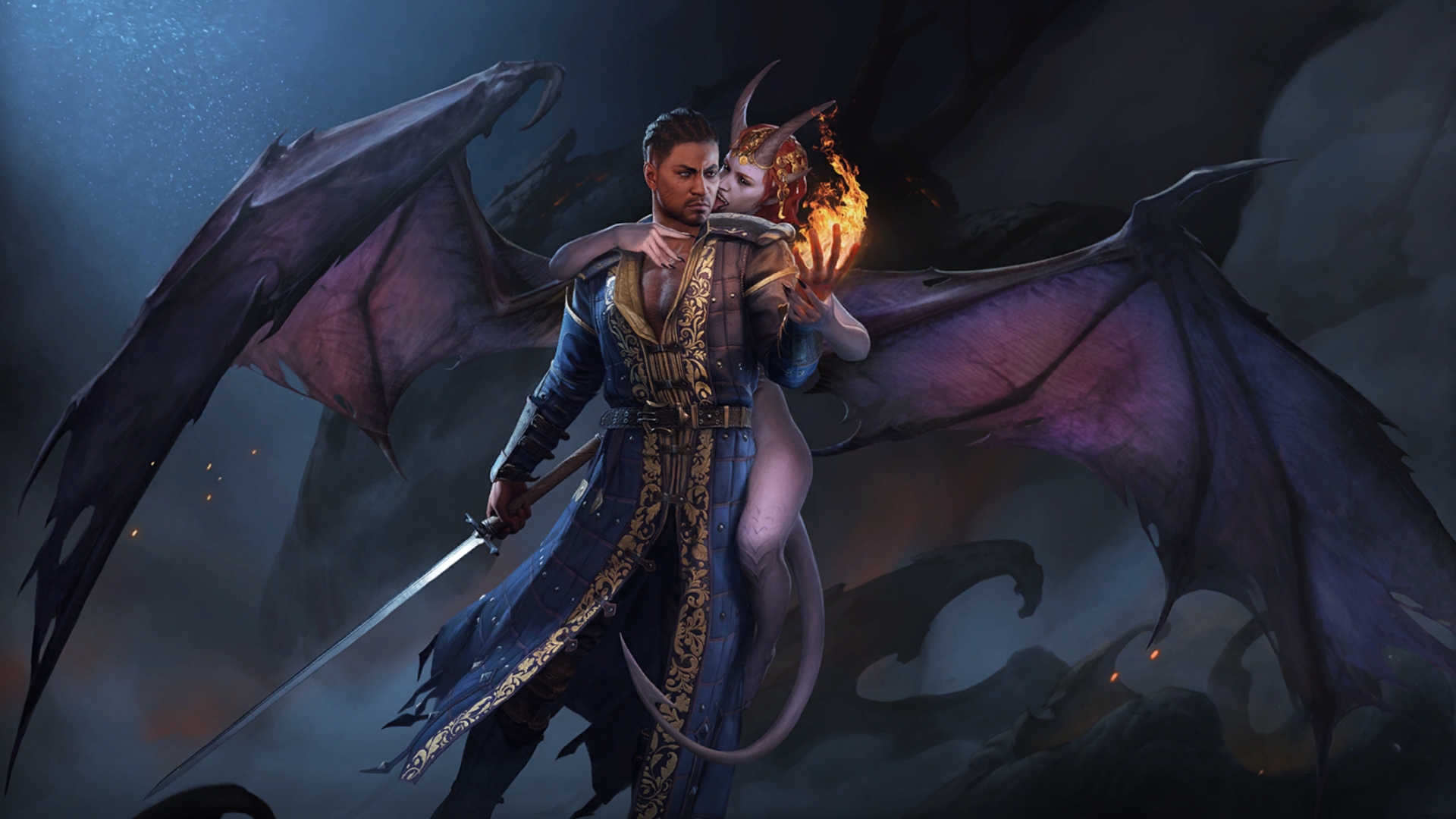
You can take two short rests between each long rest, and the other good thing about them is they don't bring the tadpole any closer to dominating your brain and turning you into a mind flayer. Which is nice.
That's enough to be getting on with, but if you'd like to learn more about D&D, one way to do that is with Before the Storm. It's an online choose-your-own-adventure that introduces 5E's rules, and you can play it in your browser. If you like the character you make in that adventure, you might even want to recreate them in Baldur's Gate 3.

Jody's first computer was a Commodore 64, so he remembers having to use a code wheel to play Pool of Radiance. A former music journalist who interviewed everyone from Giorgio Moroder to Trent Reznor, Jody also co-hosted Australia's first radio show about videogames, Zed Games. He's written for Rock Paper Shotgun, The Big Issue, GamesRadar, Zam, Glixel, Five Out of Ten Magazine, and Playboy.com, whose cheques with the bunny logo made for fun conversations at the bank. Jody's first article for PC Gamer was about the audio of Alien Isolation, published in 2015, and since then he's written about why Silent Hill belongs on PC, why Recettear: An Item Shop's Tale is the best fantasy shopkeeper tycoon game, and how weird Lost Ark can get. Jody edited PC Gamer Indie from 2017 to 2018, and he eventually lived up to his promise to play every Warhammer videogame.

